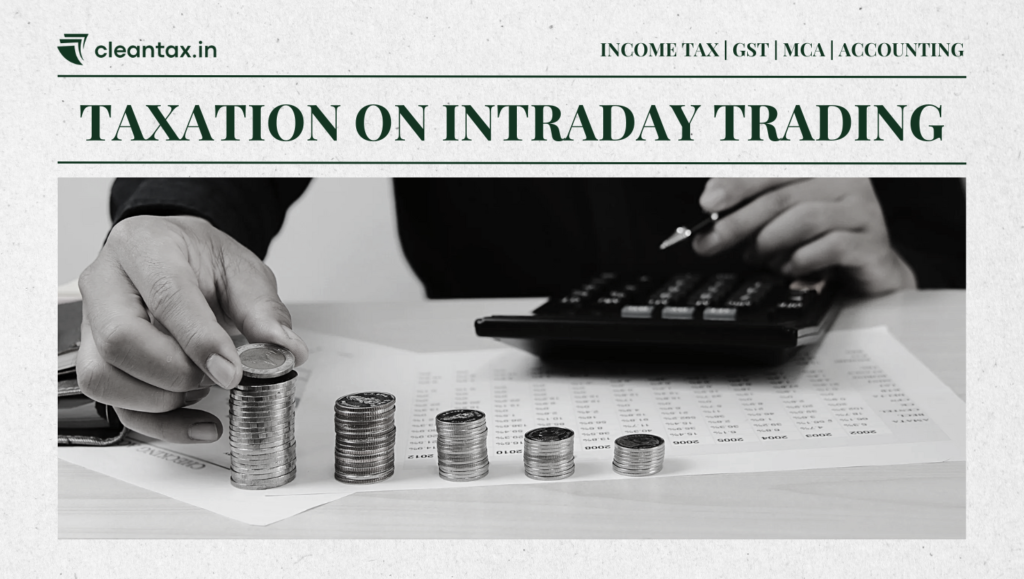Taxation on Intraday trading, where shares are bought and sold within the same trading day, is a popular avenue for those looking to earn quick profits in the stock market.
However, along with potential gains, it brings specific tax implications that traders must understand to stay compliant and optimize their earnings. This guide provides a detailed overview of the tax rules for intraday trading in India.
How Intraday Trading is Classified for Tax Purposes
Taxation on Intraday trading is treated differently from regular stock investments:
| Classification | Description | Tax Implication |
|---|---|---|
| Capital Assets | Stocks or investments held for a longer period (delivery-based trading). | Taxed as short-term or long-term capital gains. |
| Business Income | Stocks actively traded (without delivery, like in intraday). | Taxed as speculative business income. |
In intraday trading, shares are not delivered; hence, the profit or loss from these transactions is categorized as speculative income under the "Profits and Gains from Business and Profession" section of the Income Tax Act.
Taxation on Intraday Trading Income
Taxation on Intraday Trading is based on your total income and fall under business income. Here are the key aspects:
Tax Rates
- Speculative income: Taxed at regular income slab rates.
- Applicable tax rates under the old and new tax regimes:
| Income Range | Old Tax Regime | New Tax Regime |
|---|---|---|
| Up to ₹2.5 Lakh | Nil | Nil |
| ₹2.5–₹5 Lakh | 5% | 5% |
| ₹5–₹10 Lakh | 20% | 10% |
| ₹10–₹12 Lakh | 30% | 15% |
| ₹12–₹15 Lakh | 30% | 20% |
| Above ₹15 Lakh | 30% | 30% |
Tax Audit Requirements
A tax audit may be necessary for intraday traders based on their turnover and profit.
| Criteria | Audit Requirement |
|---|---|
| Turnover ≤ ₹2 Crore | Audit required if profit is less than 6% of turnover and cash transactions are high. |
| Turnover ₹2–₹10 Crore | Audit is mandatory if profit is less than 6%. |
| Turnover > ₹10 Crore | Audit is compulsory if transactions are primarily cash-based. |
Turnover Calculation for Intraday Trading
Turnover on the taxation on intraday trading is calculated as the sum of absolute profits and losses from all trades:
Example:
- Profit from Trade 1: ₹1,000
- Loss from Trade 2: ₹2,000
- Total Turnover = ₹1,000 (absolute profit) + ₹2,000 (absolute loss) = ₹3,000
Filing Taxes for Intraday Trading
Forms to Use
- ITR-3: Required for reporting speculative business income.
- Filing Deadlines:
- Without Audit: 31st July
- WithAudit: 31st October
Losses in Intraday Trading
Losses incurred in intraday trading can only be adjusted against speculative income and carried forward for four years if not fully utilized.
| Scenario | Treatment of Losses |
|---|---|
| Loss in the Current Year | Adjust against speculative gains in the same year. |
| Unutilized Loss | Carry forward for up to 4 years to offset future speculative income. |
Taxable Income Calculation: An Example
Suppose an individual has the following incomes:
- Salary Income: ₹10 Lakh
- Intraday Trading Profit: ₹2 Lakh
- OtherIncome (e.g., interest): ₹50,000
Steps to Calculate Taxable Income:
- Combine all incomes: ₹10 Lakh (salary) + ₹2 Lakh (trading) + ₹50,000 (other income) = ₹12.5 Lakh.
- Deduct eligible exemptions or deductions (e.g., Section 80C investments, HRA).
- Apply tax rates based on the chosen regime (old or new).
Additional Costs: GST and Other Charges on Intraday Trading
While GST and transaction fees are not part of income tax, they impact your overall profitability.
| Charge | Rate |
|---|---|
| GST on Brokerage and Fees | 18% |
| SEBI Charges | ₹10 per crore of turnover |
| Stamp Duty | State-specific (varies by jurisdiction) |
It’s important to account for these costs when calculating net gains.
Optimizing Taxation and Compliance
- KeepAccurate Records: Maintain detailed documentation of all trades, profits, losses and associated charges.
- Utilize Loss Carry-Forward: Effectively manage speculative losses to reduce future tax liabilities.
- Consult Experts: Seek advice from a tax consultant for compliance, especially if your turnover requires an audit.
Here are some articles related to taxation on intraday trading:
- Income Tax on Intraday Trading - Tax Calculation & Rules
This article explains Taxation on Intraday Trading. the classification of intraday trading as speculative business income, tax calculation methods, and filing requirements. - Know the Tax on Intraday Trading Online
This resource provides a detailed breakdown of how intraday trading income is taxed, including examples and rules for offsetting losses. - Know About Income Tax on Intraday Trading
Covers income classification, tax slab rates, deductions, and audit requirements for intraday trading gains. - How Gains from Intraday Trading are Taxed in India?
Discusses speculative business income, tax filing requirements, and loss carry-forward rules for intraday traders. - Everything about Income Tax on Intraday Trading
A comprehensive guide to calculating taxes on intraday trading profits and understanding speculative income rules.
Conclusion
Intraday trading offers exciting opportunities for profit but comes with its own set of tax challenges. By understanding the tax rules, keeping proper records, and planning strategically, you can maximize your gains while staying compliant with Indian tax laws. Always stay updated with changes in tax regulations to make informed decisions and avoid unnecessary penalties.
FAQs Related to Taxation on Intraday Trading
𝐇𝐨𝐰 𝐢𝐬 𝐢𝐧𝐭𝐫𝐚𝐝𝐚𝐲 𝐭𝐫𝐚𝐝𝐢𝐧𝐠 𝐢𝐧𝐜𝐨𝐦𝐞 𝐭𝐚𝐱𝐞𝐝 𝐢𝐧 𝐈𝐧𝐝𝐢𝐚?
Intraday trading income is classified as speculative business income under the Income Tax Act and is taxed at the regular income tax slab rates applicable to the trader's total income.
𝐂𝐚𝐧 𝐢𝐧𝐭𝐫𝐚𝐝𝐚𝐲 𝐭𝐫𝐚𝐝𝐢𝐧𝐠 𝐥𝐨𝐬𝐬𝐞𝐬 𝐛𝐞 𝐚𝐝𝐣𝐮𝐬𝐭𝐞𝐝 𝐨𝐫 𝐜𝐚𝐫𝐫𝐢𝐞𝐝 𝐟𝐨𝐫𝐰𝐚𝐫𝐝?
Yes, intraday trading losses can only be adjusted against speculative gains in the same financial year. Unutilized losses can be carried forward for up to 4 years to offset future speculative gains.
𝐃𝐨 𝐈 𝐧𝐞𝐞𝐝 𝐚 𝐭𝐚𝐱 𝐚𝐮𝐝𝐢𝐭 𝐟𝐨𝐫 𝐦𝐲 𝐢𝐧𝐭𝐫𝐚𝐝𝐚𝐲 𝐭𝐫𝐚𝐝𝐢𝐧𝐠 𝐚𝐜𝐭𝐢𝐯𝐢𝐭𝐢𝐞𝐬?
A tax audit is required if:
Your turnover is below ₹2 crore and profit is less than 6% of turnover.
Your turnover exceeds ₹10 crore and most transactions are in cash.
Consult a tax professional to determine if an audit is applicable based on your specific trading activity.


